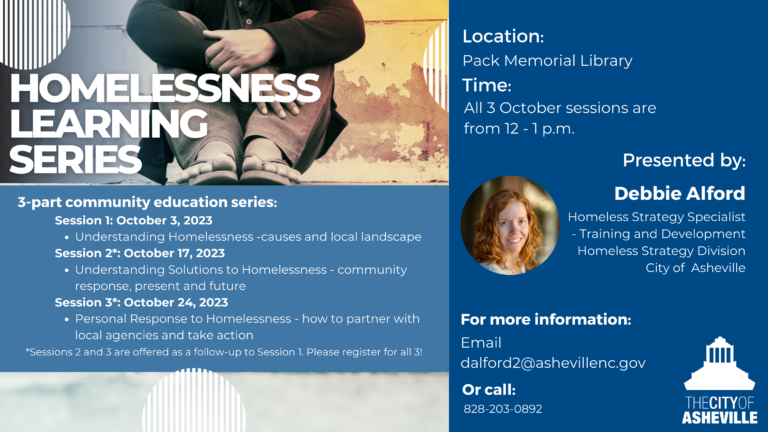The Homeless Strategy Division of the City of Asheville Community and Economic Development Department invites members of the public to join them for an informative learning series focused on homelessness in our community.
This 3-part learning series, presented by Homeless Strategy Specialist Debbie Alford, offers community members the opportunity to learn more about the causes, responses, and actions that surround the homelessness issue in Asheville and the region.
These in-person sessions are offered as a series with information building from one session to the next. Pre-Registration and attendance of all 3 sessions is recommended.
October 2023
- Session 1: October 3, 2023: Understanding Homelessness – causes and local landscape
- Session 2: October 17, 2023: Understanding Solutions to Homelessness – community response, present and future
- Session 3: October 24, 2023: Personal Response to Homelessness – how to partner with local agencies and take action
All October sessions will be held at Pack Memorial Library from 12:00 p.m. – 1:00 p.m.
November 2023
- Session 1: November 2, 2023: Understanding Homelessness – causes and local landscape
- Session 2: November 9, 2023: Understanding Solutions to Homelessness – community response, present and future
- Session 3: November 16, 2023 : Personal Response to Homelessness – how to partner with local agencies and take action
All November sessions will be held at the North Asheville Public Library from 6:00 p.m. – 7:00 p.m.
Background:
What does Homelessness look like in Asheville?
Homelessness occurs when people lack sufficient resources and support during a normal life crisis. It often coincides with unemployment, mental health disorders, substance use, criminal justice involvement, and medical issues, but the vast majority of people who experience those things daily in our community aren’t homeless.
In the 2023 Point-in-Time Count, which is an annual census of people experiencing homelessness, City of Asheville staff and volunteers identified 573 people without housing. Most people (402) were in emergency shelters or transitional housing programs. Unfortunately, 171 unsheltered people, defined as those community members who are camping, sleeping in cars, or otherwise on the street, were also counted. Detailed data are available here.
A Community Solution Approach
Ending homelessness occurs at the individual level, person by person, but requires that our homeless service system have the type and scale of resources needed to respond to each person’s unique needs. Our goal as a community is to have a well-coordinated and right-sized mix of homeless services that together form a system that’s effective and efficient at ending homelessness. Crises will always occur in all of our lives, but with a robust response system, we can prevent more people from becoming homeless, shorten the time people experience homelessness, and continually increase the number of people exiting homelessness.
The City of Asheville is not a direct provider or authority overseeing homelessness efforts within the community. Instead, as suggested by the National Alliance to End Homelessness, the City government works alongside service providers and other stakeholders to support and expand community capacity and strategies to meet the needs of people experiencing homelessness. The Homeless Initiative Advisory Committee (HIAC), serves as the governance board overseeing policy, strategy, and federal resource allocation for the Continuum of Care. HIAC is responsible for developing a collective vision and an effective and streamlined community-wide collaboration to maximize resources and efforts to best respond to homelessness together as a unified Continuum of Care.
